- Home
- David Gemmell
The Hawk Eternal Page 2
The Hawk Eternal Read online
Page 2
“Steal cattle. By all accounts you are one of the richest clansmen in the Farlain. It doesn’t make any sense.”
“Tradition,” answered Caswallon. “I’m a great believer in it.”
Leon shook his head. “One of these days you’ll be caught and hanged—or worse, knowing the Pallides. You baffle me.”
“No, I don’t. I make you rich. Yours is the cheapest beef in Ateris.”
“True. How is the lovely Maeg?”
“She’s well.”
“And Donal?”
“Lungs like bellows.”
“Keeping you awake at nights, is he?”
“When I’m not out hunting,” said Caswallon with a wink.
Leon chuckled. “I’m going to be sorry when they catch you, clansman. Truly.”
For an hour they haggled over the prices until Leon parted with a small pouch of gold, which Caswallon handed to his man Arcis, a taciturn clan crofter who accompanied him on his raids.
Now Caswallon stood on the mountainside soaking in the horror of Aenir warfare. Arcis moved alongside him. Both men had heard tales of war in the south and the awful atrocities committed by the Aenir. Foremost among these was the blood-eagle: Aenir victims were nailed to trees, their ribs splayed like tiny wings, their innards held in place with wooden strips.
Caswallon had only half believed these tales. Now the evidence hung on the blood-drenched gates of Ateris.
“Go back to the valley, my friend,” Caswallon told Arcis.
“What about the cattle?”
“Drive them back into the mountains. There are no buyers today.”
“Gods, Caswallon! Why do they go on killing? There’s no one fighting them.”
“I don’t know. Tell Cambil what we have seen today.”
“What about you?”
“I’ll stay for a while.”
Arcis nodded and set off across the slopes, running smoothly.
After a while the Aenir warriors drifted into the city. The plain before the gates was littered with corpses. Caswallon moved closer, stopping when he neared the tree line. Now he could see the full scale of the horror and his anger settled, cold and malignant. The cattle dealer, Leon, lay in a pool of blood, his throat torn open. Near him was the boy thief Gaelen.
Caswallon swung away and moved back toward the trees.
I am dying. There was no doubt in Gaelen’s mind. The pain from his lower back was close to unbearable, his head ached, the blood was seeping from his left eye. For a long while he lay still, not knowing if the enemy was close by; whether indeed an Aenir warrior was at this moment poised above him with a spear or a sharp-edged sword.
Fear cut through his pain but he quelled it savagely. He could feel the soft, dusty clay against his face and smell the smoke from the burning city. He tried to open his eyes, but blood had congealed on the lashes. I have been unconscious for some time, he thought.
An hour? Less? Carefully, he moved his right arm, bringing his hand to his face, rubbing his right eye with his knuckle to free the lashes. The pain from his left eye intensified and he left it alone, sealed shut. He was facing the shuttered gates and the ghastly ornaments they now carried. Around him the crows were already settling, their sharp beaks ripping at moist flesh. Two of them had landed on the chest of Leon. Gaelen looked away. There were no Aenir in sight. Gingerly he probed the wound above his left hip, remembering the lance that had cut through him as he ran. The wound still bled on both sides, and the flesh was angry and raw to the touch.
Turning his head toward the mountains, and the tall pine trees on the nearest slope, he tried to estimate the time it would take him to reach the safety of the woods. He made an effort to stand, but a roaring began in his ears, like an angry sea. Dizziness swamped him and he lost consciousness.
When he awoke it was close to dusk. His side was still bleeding, though it had slowed to a trickle, and once again he had to clear his eye of blood. When he had done so he saw that he had crawled twenty paces. He couldn’t remember doing it, but the trail of blood and scored dust could not lie.
Behind him the city burned. It would not be long before the Aenir returned to the plain. If he was found he would be hauled back and blood-eagled like the elders.
The boy began to crawl, not daring to look up lest the distance demoralize him, forcing him to give in.
Twice he passed out for short periods. After the last he cursed himself for a fool and rolled to his back, ripping two strips of cloth from his ragged tunic. These he pressed into the wounds on his hip, grunting as the pain tore into him. They should slow the bleeding, he thought. He crawled on. The journey, begun in pain and weakness, became a torment. Delirious, Gaelen lived again the horror of the attack. He had stolen a chicken from Leon and was racing through the market when the sound of screaming women and pounding hooves made him forget the burly butcher. Hundreds of horsemen came in sight, slashing at the crowd with long swords and plunging lances.
All was chaos and the boy had been petrified. He had hidden in a barn for several hours, but then had been discovered by three Aenir soldiers. Gaelen had run through the alleys, outpacing them, but had emerged into the city square where a rider looped a rope over his shoulders, dragging him out through the broken gates. All around him were fierce-eyed warriors with horned helms, screaming and chanting, their faces bestial.
The rider with the rope hailed two others at the city gates.
“Sport, Father!” yelled the man, his voice muffled by his helm.
“From that wretch?” answered the other contemptuously, leaning across the neck of his horse. The helm he wore carried curved horns, and a face mask in bronze fashioned into a leering demon. Through the upper slits Gaelen could see a glint of ice-blue eyes, and fear turned to terror within him.
The rider who had roped Gaelen laughed. “I saw this boy on my last scouting visit. He was running from a crowd. He’s fast. I’ll wager I land him before you.”
“You couldn’t land a fish from a bowl,” said the third rider, a tall wide-shouldered warrior with an open helm. His face was broad and flat, the eyes small and glittering like blue beads. His beard was yellow and grimy, his teeth crooked and broken. “But I’ll get him, by Vatan!”
“Always the first to boast and the last to do, Tostig,” sneered the first rider.
“Be silent, Ongist,” ordered the older man in the horned helm. “All right, I’ll wager ten gold pieces I gut him.”
“Done!” The rider leaned over toward the boy, slicing the dagger through the rope. “Go on, boy, run.”
Gaelen heard the horse start after him, and throwing himself to the ground, he grabbed a rock and hurled it. The yellow-bearded warrior—Tostig?—pitched from his rearing mount.
Then the lance struck him. He tried to rise, only to see a sword blade flash down.
“Well ridden, Father!” were the last words he heard before the darkness engulfed him.
Now as he crawled all sense of time and place deserted him. He was a turtle on a beach of hot coals, slowly burning; a spider within an enamel bowl of pain, circling; a lobster within a pan as the heat rose.
But still he crawled.
Behind him walked the yellow-bearded warrior he had pitched to the ground. In his hand was a sword and upon his lips a smile.
Tostig was growing bored now. At first he had been intrigued by the wounded boy, wondering how far he could crawl, and imagining the horror and despair when he discovered the effort was for nothing. But now the boy was obviously delirious, and there was little point in wasting time. He raised the sword, pointing downward above the boy’s back.
“Kill him, my bonny, and you will follow him.”
Tostig leaped back a pace, his sword flashing up to point toward the shadow-haunted trees as a figure stepped out into the fading light. He was tall, wearing a leather cloak and carrying an iron-tipped quarterstaff. Two daggers hung from a black leather baldrick across his chest, and a long hunting knife dangled by his hip. He was green-eyed, and a dark trident beard
gave him a sardonic appearance.
Tostig looked beyond the man, straining to pierce the gathering darkness of the undergrowth. The warrior seemed to be alone.
The clansman stepped forward and stopped just out of reach of the Aenir’s sword. Then he leaned on his staff and smiled. “You’re on Farlain land,” he said.
“The Aenir walk where they will,” Tostig replied.
“Not here, my bonny. Not ever. Now, what’s it to be? Do you leave or die?”
Tostig pondered a moment. His father, Asbidag, had warned the army not to alienate the clans. Not yet. One mouthful at a time, that was Asbidag’s way.
And yet this clansman had robbed Tostig of his prey.
“Who are you?” Tostig countered.
“Your heart has about five beats of life left in it, barbarian,” said Caswallon.
Tostig stared deeply into the sea-green eyes. Had he been sure the man was alone, he would have risked battle. But he was not sure. The man was too confident, too relaxed. No clansman alive would face an armed Aenir in such a way. Unless he had an edge. Tostig glanced once more at the trees. Archers no doubt had him in range at this moment.
“We will meet again,” he said, backing away down the slope.
Caswallon ignored him, and knelt by the bleeding youngster.
Gently he turned him to his back, checking his wounds. Satisfied they were plugged, he lifted the boy to his shoulder, gathered up his staff, entered the shadows, and was gone from the sight of the Aenir.
Gaelen turned in his bed and groaned as the stitches front and back pulled at tender, bruised flesh. He opened his eyes and found himself staring at a grey cave wall. The smell of burning beechwood was in his nostrils. Carefully he moved onto his good side. He was lying on a broad bed, crafted from pine and expertly joined; over his body were two woolen blankets and a bearskin cloak. The cave was large, maybe twenty paces wide and thirty deep, and at the far end it curved into a corridor. Looking back, the boy saw that the entrance was covered with a hide curtain. Gingerly he sat up. Somebody had bandaged his side and his injured eye. Gently he probed both areas. The pain was still there, but more of a throbbing reminder of the acute agony he remembered from his long crawl.
Across from the bed, beyond a table and some chairs rough-cut from logs, was a man-made hearth skillfully chipped away at the base of a natural chimney in the cave wall. A fire was burning brightly. Beside it were chunks of beechwood, a long iron rod, and a copper shovel.
Bright sunlight shafted past the edges of the curtain and the boy’s gaze was drawn to the cave entrance. Groaning as he rose, he limped across the cave, lifting the flap and looking out over the mountains beyond. He found himself gazing down into a green and gold valley dotted with stone buildings and wooden barns, sectioned fields and ribbon streams. Away to his left was a herd of shaggy long-horned cattle, and elsewhere he could see sheep and goats, and even a few horses in a paddock by a small wood. His legs began to tremble and he dropped the curtain.
Slowly he made his way to the table and sat down. Upon it was an oatmeal loaf and a jug of spring water. His stomach tightened, hunger surging within him as he tore a chunk from the loaf and poured a little water into a clay goblet.
Gaelen was confused. He had never been this far into the Highlands. No Lowlander had. This was forbidden territory. The clansmen were not a friendly people, and though they occasionally came into Ateris to trade, it was well known to be folly for any city-dweller to attempt a return visit.
He tried to remember how he had come here. He seemed to recall voices as he struggled to reach the trees, but the memory was elusive and there had been so many dreams.
At the back of the cave the man called Oracle watched the boy eating and smiled. The lad was strong and wolf-tough. For the five days he had been here he had battled grimly against his wounds, never crying—even when, in his delirium, he had relived fear-filled moments of his young life. He had regained consciousness only twice in that time, accepting silently the warm broth that Oracle held to his lips.
“I see you are feeling better,” said the old man, stepping from the shadows.
The boy jumped and winced as the stitches pulled. Looking around, he saw a tall, frail, white-bearded man dressed in grey robes, belted at the waist with a goat-hair rope.
“Yes. Thank you.”
“What is your name?”
“Gaelen. And you?”
“I no longer use my name, but it pleases the Farlain to call me Oracle. If you are hungry I shall warm some broth; it is made from the liver of pigs and will give you strength.”
Oracle moved to the fire, stooping to lift a covered pot to the flames. “It will be ready soon. How are your wounds?”
“Better.”
The old man nodded. “The eye caused me the most trouble. But I think it will serve you. You will not be blind, I think. The wound in your side is not serious, the lance piercing just above the flesh of the hip. No vital organ was cut.”
“Did you bring me here?”
“No.” Using the iron rod, Oracle lifted the lid from the pot. Taking a long-handled wooden spoon from a shelf, he stirred the contents. Gaelen watched him in silence. In his youth he must have been a mighty man, thought the boy. Oracle’s arms were bony now, but the wrists were thick and his frame broad. The old man’s eyes were light blue under thick brows, and they glittered like water on ice. Seeing the boy staring at him, he chuckled. “I was the Farlain Hunt Lord,” he said, grinning. “And I was strong. I carried the Whorl boulder for forty-two paces. No man has bettered that in thirty years.”
“Were my thoughts so obvious?” Gaelen asked.
“Yes,” answered Oracle. “The broth is ready.”
They ate in silence, spooning the thick soup from wooden bowls and dipping chunks of oatmeal loaf into the steaming liquid.
Gaelen could not finish the broth. He apologized, but the old man shrugged.
“You’ve hardly eaten at all in five days, and though you are ravenous your stomach has shrunk. Give it a few moments, then try a little more.”
“Thank you.”
“You ask few questions, young Gaelen. Is it that you lack curiosity?”
The boy smiled for the first time. “No, I just don’t want any answers yet.”
Oracle nodded. “You are safe here. No one will send you back to the Aenir. You are welcome, free to do as you wish. You are not a prisoner. Now, do you have any questions?”
“How did I get here?”
“Caswallon brought you. He is a clansman, a Hunt Master.”
“Why did he save me?”
“Why does Caswallon do the things he does? I don’t know. Caswallon doesn’t know. He is a man of impulse. A good friend, a terrible enemy, and a fine clansman—but still a man of impulse. When he was a youth he went tracking deer. He was following a doe when he came upon it caught in a Pallides snare. Now, the Farlain have no love for the Pallides, so Caswallon cut the deer loose—only to find it had an injured leg. He brought the little beast home upon his back and nursed it to health; then he released it. There’s no accounting for Caswallon. Had the beast been fit he would have slain it for meat and hide.”
“And I am like that injured doe,” said Gaelen. “Had I run into the trees unharmed, Caswallon might have killed me.”
“Yes, you are sharp, Gaelen. I like quick wits in a boy. How old are you?”
The boy shrugged. “I don’t know. Fourteen, fifteen . . .”
“I’d say nearer fourteen, but it doesn’t matter. A man is judged here by how he lives and not by the weight of his years.”
“Will I be allowed to stay, then? I thought only clansmen could live in the Druin mountains?”
“Indeed you can, for indeed you are,” said Oracle.
“I don’t understand.”
“You are a clansman, Gaelen. Of the Farlain. You see, Caswallon invoked the Cormaach. He has made you his son.”
“Why?”
“Because he had no choice. As you s
aid yourself, only a clansman can live here and Caswallon—like all other clansmen—cannot bring strangers into the Farlain. Therefore in the very act of rescuing you he became your guardian, responsible in law for everything you do.”
“I don’t want a father,” said Gaelen. “I get by on my own.”
“Then you will leave,” agreed Oracle, amiably. “And Caswallon will give you a cloak, a dagger, and two gold coins for the road.”
“And if I stay?”
“Then you will move into Caswallon’s house.”
Needing time to think, Gaelen broke off a piece of bread and dipped it into the now lukewarm broth.
Become a clansman? A wild warrior of the mountains? And what would it be like to have a father? Caswallon, whoever he was, wouldn’t care for him. Why should he? He was just a wounded doe brought home on a whim. “When must I decide?”
“When your wounds are fully healed.”
“How long will that be?”
“When you say they are,” said the old man.
“I don’t know if I want to be a clansman.”
“Reserve your judgment, Gaelen, until you know what it entails.”
That night Gaelen awoke in a cold sweat, screaming.
The old man ran from the back of the cave, where he slept on a narrow pallet bed, and sat down beside the boy. “What is it?” he asked, stroking Gaelen’s brow, pushing back the sweat-drenched hair from the boy’s eyes.
“The Aenir! I dreamed they had come for me and I couldn’t get away.”
“Do not fear, Gaelen. They have conquered the Lowlands, but they will not come here. Not yet. Believe me. You are safe.”
“They took the city,” said Gaelen, “and the militia were overrun. They didn’t even hold for a day.”
“You have much to learn, boy. About war. About warriors. Aye, the city fell, and before it other cities. But we don’t have cities here, and we need no walls. The mountains are like a fortress, with walls that pierce the clouds. And the clansmen don’t wear bright breastplates and parade at festivals, they don’t march in unison. Stand a clansman against a Lowlander and you will see two men, but you will not be seeing clearly. The one is like a dog, well trained and well fed. It looks good and it barks loud. The other is like a wolf, lean and deadly. It barks not at all. It kills. The Aenir will not come here yet. Trust me.”

 Bloodstone
Bloodstone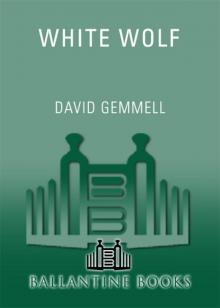 White Wolf
White Wolf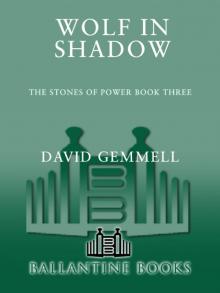 Wolf in Shadow
Wolf in Shadow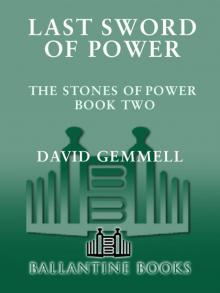 Last Sword of Power
Last Sword of Power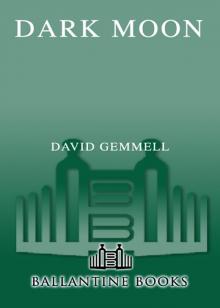 Dark Moon
Dark Moon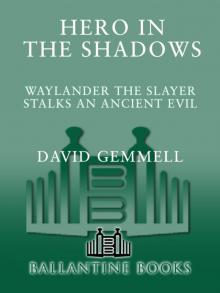 Hero in the Shadows
Hero in the Shadows Gemmell, David - Drenai 09 - Hero In The Shadows
Gemmell, David - Drenai 09 - Hero In The Shadows Waylander
Waylander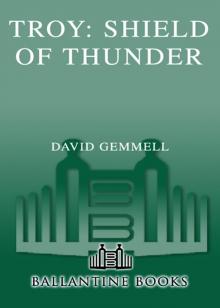 Shield of Thunder
Shield of Thunder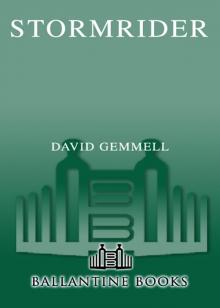 Stormrider Stormrider
Stormrider Stormrider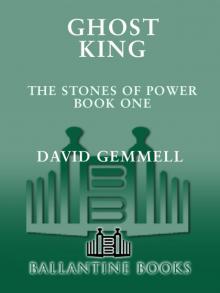 Ghost King
Ghost King Legend
Legend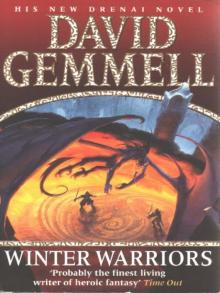 Winter Warriors
Winter Warriors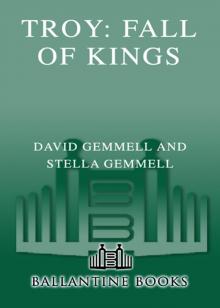 Fall of Kings
Fall of Kings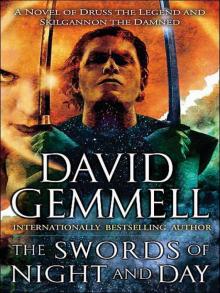 The Swords of Night and Day
The Swords of Night and Day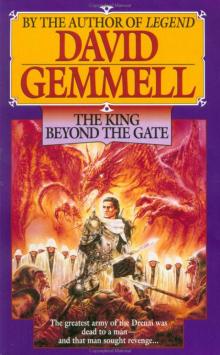 The King Beyond the Gate
The King Beyond the Gate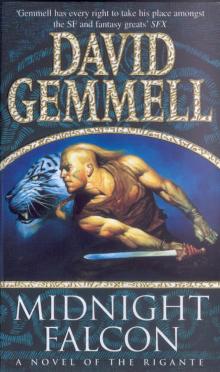 Midnight Falcon
Midnight Falcon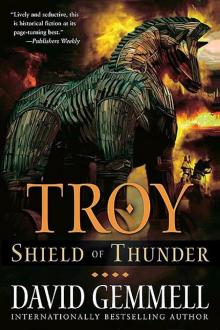 02 - Shield of Thunder
02 - Shield of Thunder In the Realm of the Wolf
In the Realm of the Wolf Ravenheart
Ravenheart The First Chronicles of Druss the Legend
The First Chronicles of Druss the Legend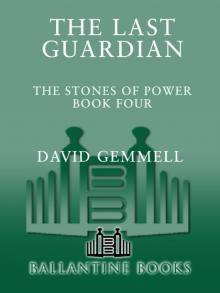 Last Guardian
Last Guardian Stormrider
Stormrider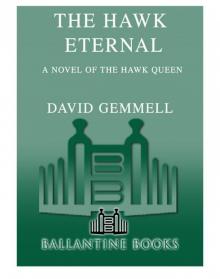 The Hawk Eternal
The Hawk Eternal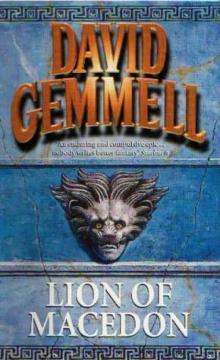 Lion of Macedon
Lion of Macedon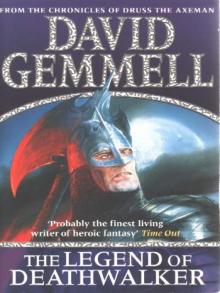 The Legend of Deathwalker
The Legend of Deathwalker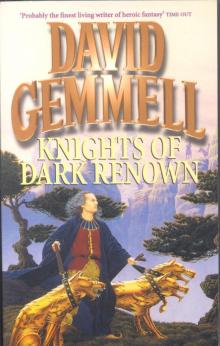 Knights of Dark Renown
Knights of Dark Renown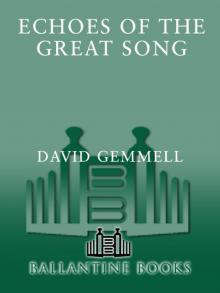 Echoes of the Great Song
Echoes of the Great Song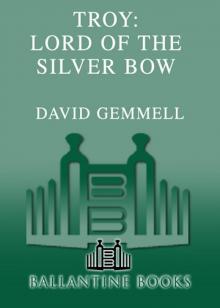 Lord of the Silver Bow
Lord of the Silver Bow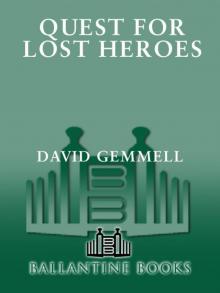 Quest for Lost Heroes
Quest for Lost Heroes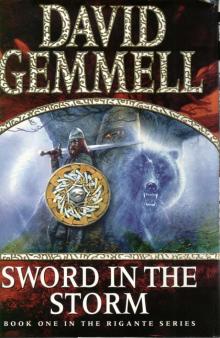 Sword in the Storm
Sword in the Storm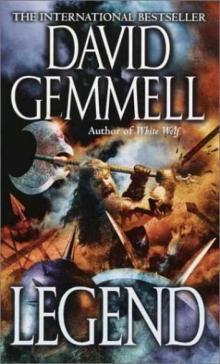 Drenai Saga 01 - Legend
Drenai Saga 01 - Legend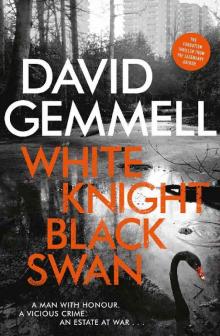 White Knight/Black Swan
White Knight/Black Swan![[Troy 02] - Shield of Thunder Read online](http://i1.bookreadfree.com/i/03/19/troy_02_-_shield_of_thunder_preview.jpg) [Troy 02] - Shield of Thunder
[Troy 02] - Shield of Thunder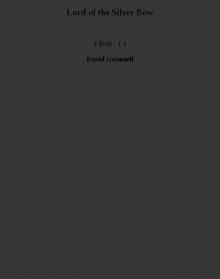 Lord of the Silver Bow t-1
Lord of the Silver Bow t-1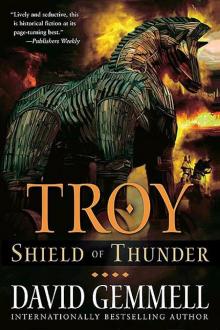 Shield of Thunder t-2
Shield of Thunder t-2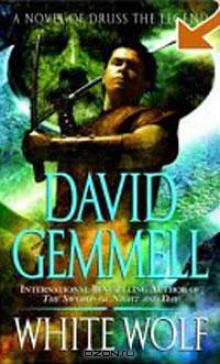 White Wolf: A Novel of Druss the Legend dt-10
White Wolf: A Novel of Druss the Legend dt-10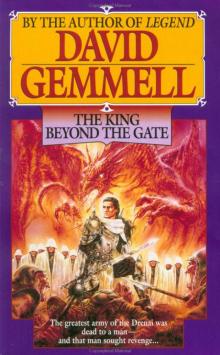 Drenai Saga 02 - The King Beyond the Gate
Drenai Saga 02 - The King Beyond the Gate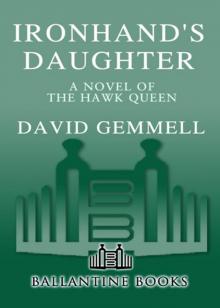 Ironhand's Daughter
Ironhand's Daughter Gemmell, David - Drenai 06 - The First Chronicles of Druss the Legend
Gemmell, David - Drenai 06 - The First Chronicles of Druss the Legend The Last Guardian
The Last Guardian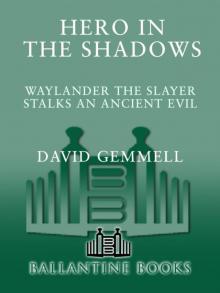 Hero in the Shadows: A Waylander the Slayer Novel
Hero in the Shadows: A Waylander the Slayer Novel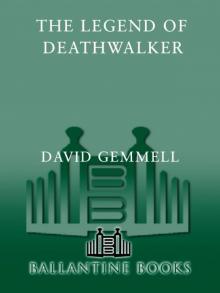 The Legend of the Deathwalker
The Legend of the Deathwalker